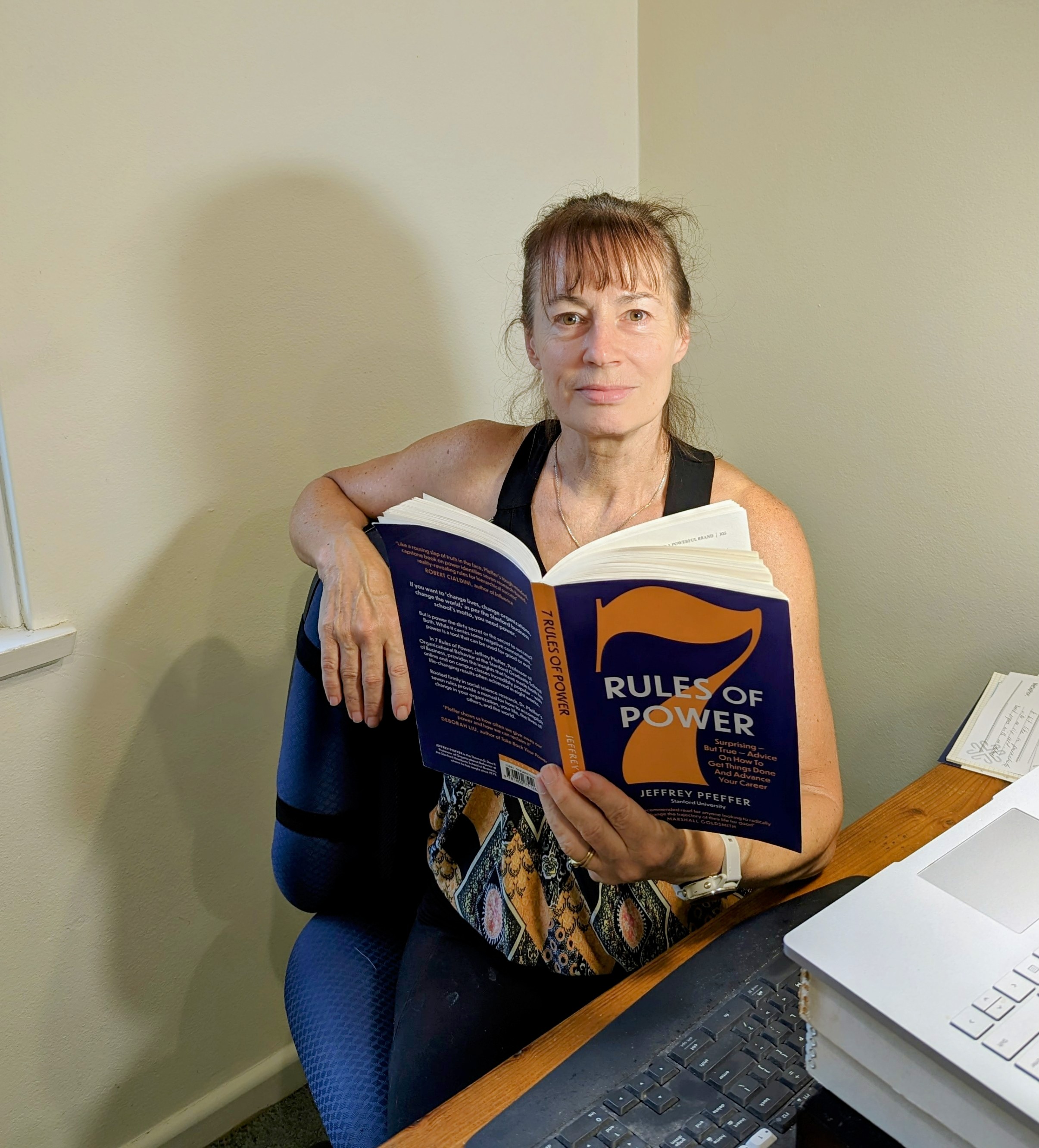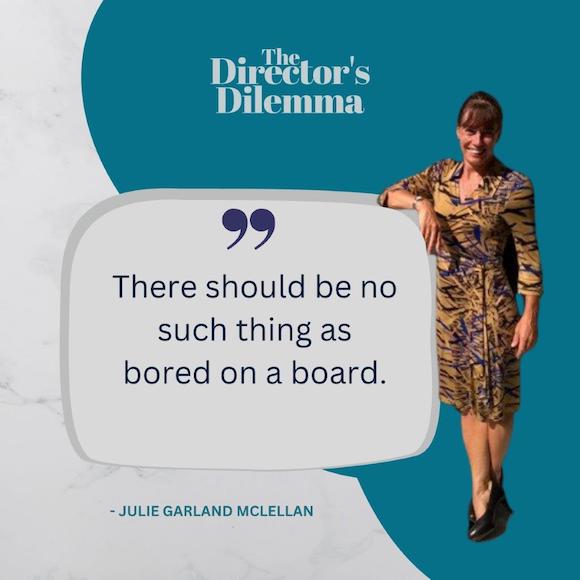|
|
|
|
|
|
|
|
|
Dear reader,
Welcome to The Director's Dilemma March 2024
Each month this newsletter looks at a real-life board scenario and considers a range of responses. The scenarios are de-identified to protect the individuals concerned. This month we advise a chair who has encountered a very unsatisfactory development in a recruitment process.
Of course, scenarios in this newsletter are general, I work with boards and directors as a confidential mentor and help them beat challenges and seize opportunities. If you would like personalised service, please call me.
To read this email in a web browser, go to www.mclellan.com.au/newsletter.html and click on 'read the latest issue'. I hope you will enjoy the latest dilemma:

Kathryn chairs a small not-for-profit board. The directors are paid, and the company is in a highly regulated financial services sector. Recently the board has been looking to appoint a new director and seeking someone with strong financial services and technology expertise.
One of Kathryn's colleagues recommended a potential director. She seemed ideal; she had a good executive career in IT within the sector, had senior executive experience, and had recently completed a company director qualification. Interviews and reference checks went well so Kathryn sought the board's approval for an offer to be made.
On receiving the offer, the candidate revealed that the same director who had recommended her to Kathryn's board had also recommended her for another board. The candidate offered to consider the role but only if the director fee was increased to exceed the fee offered by the other board.
Kathryn is torn. She liked this candidate right up until discovering that she is playing the boards off against each other to raise her fee. The candidate is a lot better than the second best from the selection and Kathryn is reluctant to start again and source a fresh bunch of prospects.
She is also quite cross with the director who recommended a candidate to two boards without mentioning that she was recommending this candidate elsewhere. It feels like a conflict of interest.
What should she do?
|
|
|
|
Robert's Answer

I don't see this as just a question of negotiating remuneration, but also of due process.
There are a number of issues for Kathryn to consider and as Chair, she should not be taking on the burden of working out the next steps by herself. I would advise Kathryn to have an open and honest conversation with the board (including the potentially conflicted director) about her concerns and to devise an agreed plan forward.
Hopefully the board's recruitment process included open discussion (ideally through a nominations committee) to agree on recruitment criteria. This should include skills needed (preferably through a skills matrix), director expertise, operational and regulatory knowledge (e.g. APRA), conflicts with other interests and remuneration. Being a non-profit, criteria should have also included personal attributes, values and commitment to purpose.
The discussion with the board should include a review of the candidates and the effectiveness of the process to ensure the preferred candidate still stands out especially when taking into consideration values and purpose.
The board may decide that the candidate is worth negotiating with or go back out to the market with a fresh recruitment drive. Kathryn and the board should proceed with caution though; remuneration disparity can create bigger long term issues and may only be possible if the board and members agree on a change to remuneration. Depending on the organisation's guiding documents, this may involve additional meetings or require a special resolution to get it approved.
Kathryn, through the governance committee, should also propose a review of the actions of the referring director as to whether a conflict of interest has occurred, or if any directors' duties and/or code of conduct have been compromised.
Robert Crowe is Director of Governance, Risk and Compliance at Key Assets (Australia) Ltd. He is also a non-executive director of Independent Living Villages and Amplfy Me. He works from Newcastle, New South Wales, Australia.
|
|
|
|
Julie's Answer

I feel like I just stepped into Dragon's Den or Shark Tank - "That's a no from me"!
Directors need great judgement; for your first board appointment, the prime consideration should be the quality of the experience and the network that will be gained from accepting the position. Affinity with the mission is important. Fee is not. This director shows poor judgement and likely doesn't understand that upping one director's fee will change the fees of the whole board. She also perhaps shows a bias towards short-term thinking.
Kathryn should start over, as none of the other candidates came close. She should also look for candidates from a wider pool than recommendations from her directors, friends, and acquaintances. If possible, use a professional search (many firms will reduce fees for non-profits) but, if not, at least use a database from her local governance institutions' or organisations such as Women on Boards, Next Director, Board Direction, etc.
Clearly the board lacks understanding of Conflict of Interest and how it is disclosed and managed. They may also misunderstand of other aspects of governance. A director's prime duty is to the interests of the organisation; interests of an individual they suggested as a board candidate should not take precedence and, once in a process, a director should not also refer the candidate elsewhere.
Rather than risk more disruption by tackling the director head on (especially if she still feels cross), Kathryn should arrange for a board review and some director development training to lift the collective understanding and value add from all her directors.
Julie Garland McLellan is an experienced non-executive director and board advisor based in Sydney, Australia.
|
|
|
|
Plácido's Answer

Motivation to serve on a board should be an important factor in choosing a board member. Money and non-profit organizations do not fit in the same statement. It seems that the main motivation of this candidate is about money, so I would say this candidate is not adequate to become a board member for a non-profit organization.
Recommending a potential candidate for a board should consider his or her motivations, and the fit of these with the organisation's purpose and culture.
I understand Kathryn being reluctant to re-start again, but she has to consider that in the long term she will be happy to make the right choice. The re-orientation of the new search process should consider values and integrity of the candidate, on top of experience and skills.
Our response to this situation, as Kathryn's advisors, would be:
-
"Questioning" the director who recommended a candidate for two positions, one of which is the company he or she serves: apply the conflict-of-interest rules according to the board regulations.
-
Rethink the offer made, given the reaction of the candidate. Ensure that the cultural and value aspects of her fit with those of a non-for-profit organisation. Playing the boards off against each other to raise her fee is not a "fair play" and should not be acceptable.
Plácido Fajardo is the Managing Partner at Leaderland Iberia S.L / AltoPartners Spain and has managed over 300 executive searches, assessments and coaching projects across Africa, Europe, North America, LATAM and Australia. Member of the Boards of Fundación Máshumano; IESE Business School Alumni; Advisory Board to Human Resources at ESADE Business School; National Board at AEDIPE (Spanish Association for People Management and Development) and Chairman of the Organization and Talent Chapter in the Fundación Cre100do. He is based in Madrid, Spain.
|
|
|
|
Chat GPT's Answer

Kathryn finds herself in a delicate situation with ethical and practical considerations. Here's some advice:
Firstly, address the conflict of interest with the director who recommended the candidate to both boards. Express your concerns about the lack of disclosure regarding the candidate's dual applications. Emphasize the importance of transparency and avoiding conflicts of interest in board appointments.
Regarding the candidate's negotiation tactic, consider the implications of agreeing to her demands. While she may possess valuable skills, her approach raises questions about her commitment to the organization's values and integrity. Assess whether her actions align with the board's ethical standards.
Evaluate the potential impact on board dynamics and organizational culture if you proceed with hiring the candidate under these circumstances. Consider whether accepting her terms sets a precedent for future negotiations and if it compromises the board's credibility.
Explore alternative options, such as revisiting other candidates from the initial selection process or widening the search to identify new prospects. While this may require additional time and resources, it ensures that the board appoints a director who aligns with its values and priorities.
Ultimately, prioritize integrity and ethical conduct in board appointments. Uphold transparency, fairness, and accountability throughout the selection process to maintain trust within the organization and uphold its reputation in the financial services sector.
Chat GPT is an artificial intelligence (or a pattern recognition, data analysis, and prediction engine). It resides in Cyberspace.
|
|
|
|
Book review - 7 Rules of Power by Jeffrey Pfeffer

I found this book refreshing in its open sharing of ways to become more powerful; I was concerned when I bought it, that I might feel sleazy whilst reading it. I didn't. If I felt anything it was vindicated in some of my own stratagems, and curious about others that I hadn't considered.
The book is full of case studies, examples and stories that bring the ideas to life and ground them in our own lived experience.
So why was it such an enjoyable enlightenment? I think perhaps because there is no mention of coercive power, no use of power to subjugate. Instead the power is generated though network, insight, reputation, and ability to add value. All of the 'rules' felt like morally acceptable processes for increasing the capacity of the reader to have an increased impact. If you want to do good, or to do more good than you currently can, this book may well help.
Of course, as with any learning, if your aims are not good then you can use the knowledge to advance those aims and have a greater negative impact. The author refrains from preaching about why to use the rules. He assumes that the vast majority of readers will want to enhance their capacity to create good outcomes. I'm going to apply the rules and attempt to prove his assumption correct.
Available at Amazon.com
Where is Julie and what is she doing?
This month I'm planning to attend the Professional Speakers Convention in Perth and the AICD Australian Governance Summit in Melbourne. If you are attending either one, please come and say "hello". I love to meet readers of the Newsletter.
I am also hosting one public course in March for you:
-
Writing Better Board Papers is running in Sydney on 6 March. Book online at https://tinyurl.com/Syd06-03-24 There are still a few spaces left so please book soon to avoid disappointment. If you would prefer an in-house course for your executive team, please call or email me, or ask your training department to contact me at julie@mclellan.com.au to find a date that suits.
Video resources - I post short video insights on LinkedIn. They disappear after a few days. You might like to visit (and please subscribe to) my YouTube channel to see the videos whenever you want to watch them. Let me know if there are any topics you would like to see addressed.
Board review - Every board - just like every other team - needs to measure its performance if it hopes to improve. When your board next needs to conduct a performance evaluation or a governance review, please remember that I would be delighted to help. If I can help, please contact me at julie@mclellan.com.au.
Inspirational quote for March

If your board is getting stale, you need to spice things up. Have a workshop, study tour, or site visit. Do a course, ask management to come up with suggestions on how you could lead them more effectively, review your agendas and annual workplan to prioritise exciting strategic issues, do something!
If you really are stumped, call me. I'll be delighted to suggest some more ideas specially for you. Whatever happens, don't get bored on your board.
A note on names - A few readers have asked me where I find the names for the protagonists in each case study; I 'borrow' them from people I meet or things that I read. The name Kathryn is a girl's name of Greek origin. It is derived from the Greek word "katharos," meaning "pure". Our protagonist Kathryn will need to work hard to ensure that her board's motives stay 'pure' and don't get subverted by doing favours to other people or prioritising other interests. She also needs to work on her own purity and respond as a good board chair rather than as an annoyed human who has been inconvenienced by the actions of another human.
This newsletter - If you have any ideas for improving the newsletter please let me know. If you are reading a forwarded copy, please visit my website and sign up for your own subscription.
Suggestions for dilemmas - Thank you to all the readers who have suggested dilemmas. They are greatly appreciated. I will answer them all eventually. I could not write this newsletter without your help and without the generous help of all the experts who respond each month to the case studies.
Be a contributor - if you would like to attempt a response to the dilemmas for publication you will be most welcome. Simply reply to this email and let me know. I am always on the lookout for new talent from around the world so please reach out if that sounds like something you could do. I am also always grateful for the generous sharing of the current and past contributors. I couldn't create such an engaging newsletter without their help.
Spread the word - if you have read this far, I assume you enjoy the newsletter – please help me to reach more directors by sharing the newsletter with your board colleagues and suggesting that they also become subscribers or by posting a recommendation on my LinkedIn page to let others know that you find the newsletter valuable.
Let's connect - I use LinkedIn to share information about boards and directorship with my friends and acquaintances. If you use LinkedIn and we are not yet connected I will welcome a connection from you. You can find me at linkedin.com/in/juliegarlandmclellan.
Farewell until the next issue due 1 April 2024. I look forward to greeting you again then.
Enjoy governing your companies, it is a privilege!
Best regards,
Julie

Main photo by Jonathan Borda from Pexels.com
Quote Illustration by Keitchy Sanchez for Julie Garland McLellan
Disclaimer: The opinions expressed above are general in nature and are designed to help you to develop your judgement as a director. They are not a definitive legal ruling and do not constitute legal advice. Names and some circumstances in the case study have been changed to ensure anonymity. Contributors to this newsletter comment in the context of their own jurisdiction; readers should check their local laws and regulations as they may be very different.
Privacy: I am privileged to have your contact details and keep them as safely as possible. I will alert you if they are ever accessed by any unauthorised person. The technical staff at ayuda help with publishing and issuing the Director's Dilemma and have access so they can send the newsletters to you. I do not sell your details to anyone; they are kept only for the intended purpose - sending you this newsletter and helping to build the judgement of company directors by providing a safe way to consider potential responses to real life events.
|
|
|
|
|
|
|








